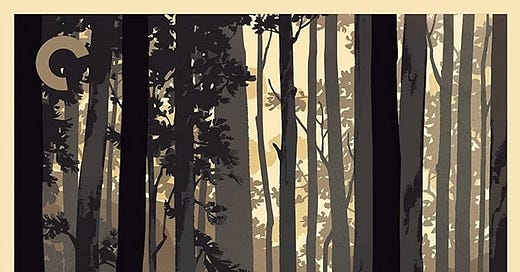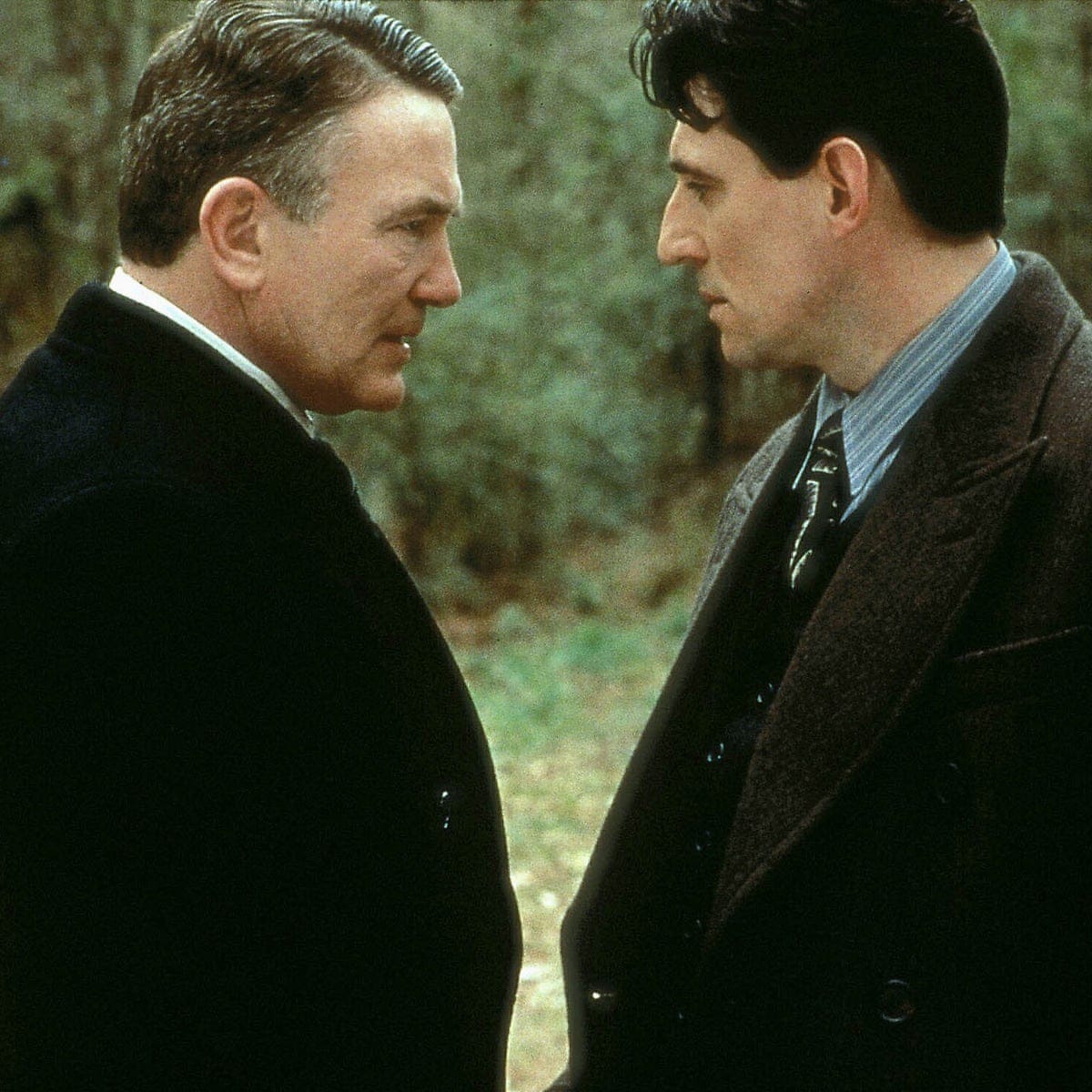The Favourites
Look In Your Heart
Ethics and Immorality in Miller’s Crossing
Nobody knows anybody. Not that well.
It’ll always be difficult to choose a favourite film of the Coen Brothers. Long time readers will know that I’ve not only written about individual films of theirs before, but that I’ve committed two separate essays to their works before (here and here). I love their explorations of humanity, their sense of cosmic justice, and their bittersweet morality. In Miller’s Crossing, their 1990 gangster noir, all of these elements are present and more. Following mob lieutenant Tom Reagan (Gabriel Byrne) as he navigates the upheaval of the criminal underworld in his city, the film explores ideas of ethics in an unethical world, man’s innate animal nature, sexuality in a dangerous time, and much more.
The crossing of the title is both a literal place in the film and a representation of the double-crosses that frequently occur throughout the film. The place, a crossroads in which Tom Reagan is tasked with murdering Bernie Bernbaum (John Turturro), is a lavish forest of trees fading from summer to fall. Under the crunch of dead leaves and blue-grey skies Reagan is first forced to question what he’s willing to do to settle the gang war. In this beautiful forest he shows his kindness. The double-crosses show his other side, his brutality and ferocity, his cold and calculating manipulations. And in these two sides we find the ethical conundrum that lies within Tom Reagan; how does one be an ethical man in a criminal world.
The difference between ethics and morality is an important distinction to make when discussing this film. In the world of Miller’s Crossing ethics is a bond, a fundamental agreement between either two people or a man and himself. It is amoral to murder a man no matter what, but it would be unethical to not respond when someone threatens you. It’s in this fallacy that our characters live, constantly striving to be the best at illegal and amoral activities, but unwilling to break the code they have established themselves. Reagan encapsulates this conundrum fully, as he refuses to betray his boss and friend Leo O’Bannon (Albert Finney) in business, but is willing to betray his trust when it comes to his girl Verna Bernbaum (Marcia Gay Harden). The mixing of morality, ethicality, and betrayal is what makes Tom Reagan such a fascinating character.
I'm talkin' about friendship. I'm talkin' about character. I'm talkin' about - hell. Leo, I ain't embarrassed to use the word - I'm talkin' about ethics.
The film questions the old adage about having honor amongst thieves. The men of Miller’s Crossing are murderers, drug dealers, bootleggers, and violent men, but they believe that if they live by a code they are acting with the boundaries of society. They see themselves as separate from the world around them, as a separate entity from the citizens and civilians. But as we see in the film, they are as entangled in every day life as everyone else. They work alongside the police and the mayor, they corrupt the businesses and the streets, in the world we are shown they are almost the only semblance of society we see. But it’s known they are not the only society, and that what they are doing is fundamentally amoral. Just because they are the dominate force within the society we see does not mean they have the moral high ground.
So when the film opens on rival gangster Johnny Casper (Jon Polito) asking Leo to do “what’s right”, it’s a complaint made in irony. Seeking retribution for Bernie selling insider information about certain fights Casper has rigged, we see the structure of criminal ethics; you can kill a man, just don’t cheat him. This upending of traditional ethical structures is the same that Reagan faces throughout the film. It’s ethical to kill for Leo, but he feels guilty for sleeping with Leo’s lady. It’s proper to take a beating you deserve, but if you fight back your attackers are going to think less of you. Not only is this ethical dilemma the main driving factor for Reagan throughout much of the film, but we see him get punished if he attempts to live a more conventionally ethical life.
His choice to spare Bernie’s life at Miller’s Crossing would have been the redemption moment for the lead character in most other crime films. But in Miller’s Crossing, not killing Bernie only further digs Reagan into trouble. Bernie returns, using the kindness Tom has shown as leverage against the Irishman. Bernie now believes Tom to be weak instead of redemptive, a belief that would ultimately lead to Bernie’s death. Bernie’s attempts to blackmail Reagan show that there is no room for kindness and pity in the criminal underworld, and it reenforces Tom’s belief in ethics within this criminal structure. When Bernie returns Tom immediately begins formulating his plans of wiping everyone who has opposed him and Leo from the board, a clean slate. Reagan did what’s right for us, but not right for his life. When Bernie pleads for his life at the end of the film, he asks again for Reagan to “look into his heart” to which Reagan replies “what heart?” Reagan has shown compassion and been burned, and now knows that he can never afford such comforts again.
You double-cross once - where's it all end? An interesting ethical question.
The funeral for Bernie that closes the film reenforces this. Leo can now clearly see that Tom had never actually betrayed him, instead having used his exile by Leo to infiltrate and betray Casper. Leo now being engaged to Verna sees any past indiscretions between Verna and Tom as under the bridge, but Tom is no longer capable of allowing a friendship between him and Leo. There is a coldness to his conversation with Leo that wasn’t present before, a manner of business. While their friendship was not the forefront of their relationship, it was something that they only shared with each other, and the cordiality is now completely gone. Tom has learned that the only person he can ever really protect is himself, and the only way he can do that is by cutting all ties to the world. He tried to hold onto Verna by protecting Bernie, and was forced to lose them both because in this underworld selfishness is the only way to survive.
The criminal underworld only exists as a facsimile of civility. The idea of animals and man is repeated invoked throughout the film, with numerous gangsters demanding to not be treated like animals. Bernie pleads for Reagan not to kill him “like some dumb animal.” Casper states that when a man can’t rely on his fixed boxing matches he has to rely on chance, saying “and then you’re back with anarchy, right back in the jungle.” The criminals of the film are desperate to not be portrayed as the savages that they are, desperate to be seen as more than just animals. They think that guns and bluster and fancy clothes can save them from the chaos they seed everywhere they go, but in the end they are recreating the jungle that they so fear.
This desperation of perception can also be seen in how they discuss clothes, and the importance of clothing (specifically Tom Reagan’s hat) throughout the film. At the end of the day the only thing that separates man from animal are the clothes on our back, and the constant references to clothes in the film shows both a fear of reverting to that animal and an anger to the way clothes make one perceived. Casper is constantly screaming about not wanting to get “the high hat” and calls people “fancy pants” as an insult. In his view he wants the separation of man and animal, but the further you get away from that animal (I.e. the more luxurious your clothing) the less trustworthy you are. It’s again a paradox, another fine line that the criminals force upon themselves, a balancing act for audiences made of only themselves. They have to be ethical murderers. They have to be dressed animals.
Tom Reagan’s hat and his near obsession with his hat is a reoccurring image in the film that plays into this theme. The film opens on his hat blowing across the land of Miller’s Crossing. Later, Tom tells Verna about a dream he had about his hat blowing away, and states “nothing more foolish than a man chasing after his hat.” This is ironic, seeing as the only reason he went to see Verna is to collect his hat from her, having lost it gambling the previous night. Tom’s hat is a main concern for him throughout the film, being the first thing he grabs after a beating, putting himself at risk in certain situations just to retrieve it. The hat plays into the ethical paradox of Tom’s life, as it’s something he claims to not care about while he obviously cares deeply for it, a placeholder for his relationships.
Like Leo, Tom’s hat is simultaneously kept in reverence and at a distance. Both are unimportant to him, easily betrayed or left behind, but ultimately he feels the need to keep both close. He dreams of his hat floating away and him not chasing it, but he knows that’s not the person he is yet. Much like how he leads everyone to believe he can betray Leo, but in the end it was all a ruse. His hat is Tom’s humanity, what separates him from the animals, but he dreams is letting it float away from him forever, dreams of the day he won’t chase it down.
Tom is constantly struggling with his basic urges, but the twist of Miller’s Crossing is that Tom Reagan is not struggling with the evils he commits but with the humanity he wants to have. Tom is a sociopath, a man willing to burn anyone and everything as long as it leaves him on the top. Tom knows the power is behind the throne, guiding the decisions of Leo while not appearing as anything other than a well worn flunky. It’s his relationship with Verna that causes him to try and be human, and it’s what ultimately burns him completely. In the final scene, Tom has given up his facade of humanity, of kindness, having lost Verna, Tom no longer needs to convince the world he’s something he’s not.
Maybe that's why I like you, Tom. I've never met anyone who made being a son of a bitch such a point of pride.
The ethics that dictate the criminal underworld and the animal kingdom are one and the same; there are none. The are imaginative lines drawn by feral creatures. When Tom Reagan speaks on ethics, this is what he means. There are no lines that can be crossed, there are no things he will not do. He tries to fight against these standards and is only betrayed by those he treated well. Miller’s Crossing is about giving into our basic urges, even if they leave us cold and abandoned, because fighting who we are can leave us vulnerable. And a vulnerable animal is a dead one.







No poll for the next Favourite? I vote for Joe Versus the Volcano.